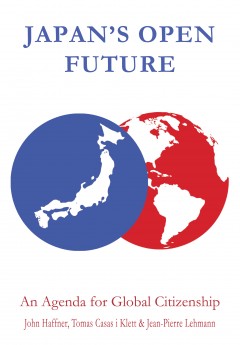Japan's Open Future
An Agenda for Global Citizenship
By John Haffner
Tomas Casas i Klett
Jean-Pierre Lehmann
Other Formats Available:
E-Book- About This Book
- Reviews
- Author Information
- Series
- Table of Contents
- Links
- Podcasts
About This Book
For many decades Japan enjoyed great success with its export-oriented economy and the outsourcing of its foreign policy to the United States under the US security umbrella. Its role in the world was simple, and times were good. But times have changed: With the end of the Cold War, a shrinking domestic population, global instabilities after 9-11, the financial crisis, and other seismic shifts, Japan now faces a more complicated world.
In this groundbreaking and provocative discussion, three foreigners who have lived and worked in Japan – a Canadian, a Frenchman and a Spaniard – argue that Japan has much to gain by pursuing a more engaged, outward-looking, multilateral posture in its region and globally. While the country will continue to enjoy good relations with the West, the time has come for Japan to embrace its Asian heritage and future, as well as its own potential contribution to world affairs. A globally engaged, more open Japan, the authors argue, is win-win-win: good for Japan, good for Asia, and good for the world. If Japan is truly to become a global citizen, however, it must not only reach out more to the world, it must also admit more of the world – new ideas, people, and capital from afar – on its own soil. But is Japan – the Japanese – prepared to do so?
For more information please see the book website: http://japansopenfuture.anthempressblog.com
Reviews
'Brilliant. It analyses Japan's mistakes and possibilities of development, and it also looks at the future development of the China-Japan relationship. Sometimes onlookers at the outside are the ones who see the inside most clearly.' —Shanghai Academy of Social Sciences
'Japan stands at the brink of a major financial crisis… Authors John Haffner, Tomas Casas i Klett and Jean-Pierre Lehmann argue that an economic mega-shock would be helpful for the Japanese economy — throwing it open to new ideas, investments and policies.' —‘The Globalist’
'What needs to done is summed up ‘Japan’s Open Future’. Authors John Haffner, Tomas Casas i Klett and Jean-Pierre Lehmann make a spirited case for a more flexible and globally engaged Japan. They also focus on the real problem: an absence of creative thinking in Tokyo.' —William Pesek, Bloomberg
'Tomas Casas i Klett, co-author of the excellent new book ‘Japan’s Open Future’ warns: ‘The world can digest one mercantilist super economy, but not two’.' —Dan Slater, Finance Asia
'This recent book by Haffner and others, ‘Japan’s Open Future’…will surely stimulate us to reconsider the Japan problem.' —The Shanghai Review of Books in ‘Oriental Morning Post’
'The three Western authors question Japan’s attitude, suggesting new ways forward; Japan should embrace its Asian heritage, while maintaining friendly relations with the Western world. When Japan moves from closedness to openness, it will also bear responsibility for the world’s politics and global economy.' —‘Social Sciences Weekly’
'The argument made by John Haffner, Tomas Casas i Klett, and Jean-Pierre Lehmann – a spirited call for an open, globally minded Japan – is certainly admirable, but I fear that there is little desire for openness and optimism among the Japanese people.' —Tobias Harris, ‘Observing Japan’ blog
'Adds a necessary perspective to the debate. The book provides a reminder that Japan’s economic and political power should not be underestimated just because there are other rising stars in the neighborhood.' —Arudou Debito, ‘Debito.org’
'Japanese people, it's time to become global citizens!' —‘Wenhui Book Review’
'This book effectively chronicles the evolution of the world’s second largest economy from feudal state to nation-state to postmodern state. Recommended.' —C. J. Talele, Columbia State Community College, ‘Choice’
'Engaging touches of humor and anecdotes combine seamlessly with serious, in-depth analysis.' —Supachai Panitchpakdi, Secretary General, United Nations Conference on Trade and Development
'The future could spell deep trouble if the Japanese do not understand the message of ‘Japan's Open Future’.' —Masaru Tamamoto, World Policy Institute
'I strongly recommend this book to the Japanese and international audience.' —Wu Jianmin, Former President of China Foreign Affairs University
'At the heart of this profound and at times gut-wrenching work, the authors ask the question, how will Japan participate in the post-American era?' —Mike Garrett, Former President, Nestlé Japan
Author Information
John Haffner works in strategic planning in the energy industry, and is a 2008 World Fellow at Yale University.
Dr Tomas Casas i Klett is an entrepreneur operating in China and a lecturer at the University of St. Gallen in Switzerland.
Dr Jean-Pierre Lehmann is Professor of International Political Economy at IMD; he is also Founding Director of the Evian Group.
Series
Anthem Asia-Pacific Series
Table of Contents
INTRODUCTION; I. FACING HISTORY: GETTING PAST THE NATION STATE; II. GLOBAL COMMUNICATION: A MATTER OF HEART; III. ESCAPING MERCANTILISM: FROM FREE-RIDER TO DRIVER; IV. EMBRACING BUSINESS RISK: ENTREPRENEURS AND KAISHA REBORN; V. OPEN POLITICS: UNLEASHING CIVIL SOCIETY; VII. GEOPOLITICS: A GLOBAL CITIZEN; CONCLUSION; BIBLIOGRAPHY
Links
Stay Updated
Information
Latest Tweets



